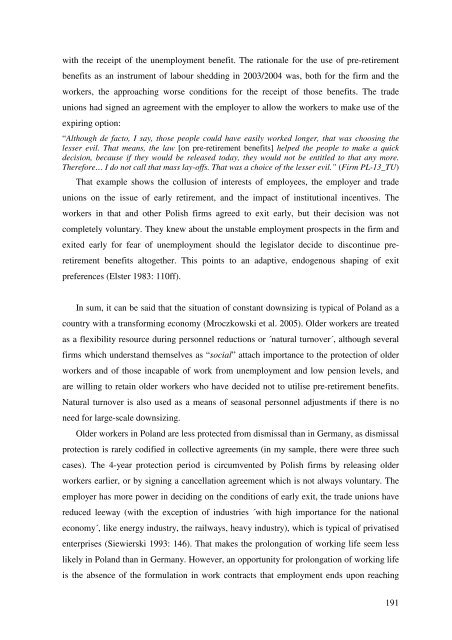Dissertation_Paula Aleksandrowicz_12 ... - Jacobs University
Dissertation_Paula Aleksandrowicz_12 ... - Jacobs University
Dissertation_Paula Aleksandrowicz_12 ... - Jacobs University
Create successful ePaper yourself
Turn your PDF publications into a flip-book with our unique Google optimized e-Paper software.
with the receipt of the unemployment benefit. The rationale for the use of pre-retirement<br />
benefits as an instrument of labour shedding in 2003/2004 was, both for the firm and the<br />
workers, the approaching worse conditions for the receipt of those benefits. The trade<br />
unions had signed an agreement with the employer to allow the workers to make use of the<br />
expiring option:<br />
“Although de facto, I say, those people could have easily worked longer, that was choosing the<br />
lesser evil. That means, the law [on pre-retirement benefits] helped the people to make a quick<br />
decision, because if they would be released today, they would not be entitled to that any more.<br />
Therefore… I do not call that mass lay-offs. That was a choice of the lesser evil.” (Firm PL-13_TU)<br />
That example shows the collusion of interests of employees, the employer and trade<br />
unions on the issue of early retirement, and the impact of institutional incentives. The<br />
workers in that and other Polish firms agreed to exit early, but their decision was not<br />
completely voluntary. They knew about the unstable employment prospects in the firm and<br />
exited early for fear of unemployment should the legislator decide to discontinue preretirement<br />
benefits altogether. This points to an adaptive, endogenous shaping of exit<br />
preferences (Elster 1983: 110ff).<br />
In sum, it can be said that the situation of constant downsizing is typical of Poland as a<br />
country with a transforming economy (Mroczkowski et al. 2005). Older workers are treated<br />
as a flexibility resource during personnel reductions or ´natural turnover´, although several<br />
firms which understand themselves as “social” attach importance to the protection of older<br />
workers and of those incapable of work from unemployment and low pension levels, and<br />
are willing to retain older workers who have decided not to utilise pre-retirement benefits.<br />
Natural turnover is also used as a means of seasonal personnel adjustments if there is no<br />
need for large-scale downsizing.<br />
Older workers in Poland are less protected from dismissal than in Germany, as dismissal<br />
protection is rarely codified in collective agreements (in my sample, there were three such<br />
cases). The 4-year protection period is circumvented by Polish firms by releasing older<br />
workers earlier, or by signing a cancellation agreement which is not always voluntary. The<br />
employer has more power in deciding on the conditions of early exit, the trade unions have<br />
reduced leeway (with the exception of industries ´with high importance for the national<br />
economy´, like energy industry, the railways, heavy industry), which is typical of privatised<br />
enterprises (Siewierski 1993: 146). That makes the prolongation of working life seem less<br />
likely in Poland than in Germany. However, an opportunity for prolongation of working life<br />
is the absence of the formulation in work contracts that employment ends upon reaching<br />
191
















